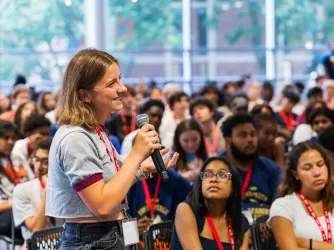Table of Contents
Judge José Cabranes: Threats to Academic Freedom Are a ‘National Problem’

On Tuesday, Judge José Cabranes, who sits on the U.S. Court of Appeals for the Second Circuit, published a towering defense of academic freedom in the opinions section of The Washington Post.
Judge Cabranes—a highly respected jurist as well as a former trustee of Yale, Columbia, and Colgate universities—has been sounding the alarm about threats to academic freedom for years now. But his latest article could not have come at a more critical time for faculty concerned about academic freedom on campus: Over the past few years, FIRE has seen a dramatic increase in cases involving investigation or punishment of faculty members’ classroom expression, and these threats seem only to be increasing as more universities adopt broad policies under which students are encouraged to report any speech that offends them to administrators.
In his Post op-ed, Judge Cabranes cuts right to the chase, stating that “[r]ecent attempts to shame professors for unpopular views and to curtail the due process rights of those accused of misconduct are cause for alarm” and that “the erosion of academic freedom has become a national problem.”
And Cabranes hits the nail on the head when it comes to how threats to academic freedom often manifest themselves on today’s campus:
Certainly, today’s critics of academic freedom rarely deny that professors should be able to write and teach freely. But they nonetheless insist that professors should exercise such liberty in the shadow of other values, such as civility, sex equality and social justice. While these are worthy ideals, they can become tools for suppressing free expression — just as anti-communism once was.
Cabranes also calls universities out for their “bias response teams,” noting the chilling effect that universities’ efforts to collect anonymous reports from offended students are likely to have on professors’ classroom speech.
His concern is far from hypothetical. Just last summer, FIRE reported on a situation at the University of Northern Colorado that precisely illustrates its validity. There, an adjunct professor recorded a meeting he had with a university administrator after a student filed a bias incident report over comments he made in class (specifically, the professor had played devil’s advocate in a discussion about transgender rights in an effort to promote debate). Although the administrator understood the professor’s pedagogical intent, he nonetheless suggested that the professor “avoid the topic for the rest of the semester” so as not to offend students who might not grasp that intent.
Cabranes also criticizes the general lack of due process on campus and its particular impact on faculty, noting that many universities ignore rights “which the American Association of University Professors has described as essential in any fair proceeding.” Among the due process concerns he identifies is the fact that in sexual misconduct proceedings, “[t]he standard of proof is reduced to ‘a preponderance of the evidence,’ the lowest possible bar.”
He writes:
Nobody can doubt that sexism, along with other forms of pernicious discrimination, can create problems on campuses. But universities can fight these evils without sacrificing the due process rights that have long guarded professors’ freedom to teach and write.
At a time when academic freedom is under threat and faculty rights are dangerously few, FIRE is grateful that Judge Cabranes chose to use his influential voice to weigh in on this critical issue.
You can read his excellent piece in full here.
Recent Articles
FIRE’s award-winning Newsdesk covers the free speech news you need to stay informed.

FIRE’s defense of pollster J. Ann Selzer against Donald Trump’s lawsuit is First Amendment 101

Cosmetologists can’t shoot a gun? FIRE ‘blasts’ tech college for punishing student over target practice video

China’s censorship goes global — from secret police stations to video games
